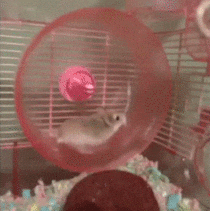Is time management, het vermogen om de tijd effectief en productief te gebruiken, een pluspunt of eerder een sluipend gif dat onze levens vergiftigt met eindeloze to-dolijsten? Eén mogelijk antwoord op die vraag hoorde ik in de Long Reads podcast van The Guardian. 1Oliver Burkeman, Why time management is ruining our lives, The Guardian, 22 december 2016. Daarin komen de ervaringen en meningen aan bod van o.a. Merlin Mann, Charles Duhigg en Frederick Winslow Taylor, drie heren die in een alternatieve realiteit misschien een rustig leven op een boerderij hadden geleid, maar in plaats daarvan geobsedeerd raakten door de structuur van hun agenda’s.
Hoe meer je afwerkt, hoe meer werk er komt

As with Inbox Zero, so with work in general: the more efficient you get at ploughing through your tasks, the faster new tasks seem to arrive.
Gefeliciteerd, je bent productiever dan ooit! Als beloning krijg je… nog meer werk. Het hamsterwiel van efficiëntie blijft doordraaien.
Paradox van de productiviteit: werk slim, niet minder
De paradox van de productiviteit: hoe efficiënter je wordt, hoe meer taken je krijgt. Het is alsof je sneller leert zwemmen, en men dan besluit om je in diepere wateren te gooien. Geen probleem, toch? Door de lat te verhogen zet men zichzelf onder druk steeds meer druk. Wat dat betreft kun je een interessante vergelijking maken.
There is a historical parallel for all this: it’s exactly what happened when the spread of “labour-saving” devices transformed the lives of housewives and domestic servants across Europe and North America from the end of the 19th century. Technology now meant that washing clothes no longer entailed a day bent over a mangle; a vacuum-cleaner could render a carpet spotless in minutes.
Yet as the historian Ruth Cowan demonstrates in her 1983 book More Work for Mother, the result, for much of the 20th century, was not an increase in leisure time among those charged with doing the housework. Instead, as the efficiency of housework increased, so did the standards of cleanliness and domestic order that society came to expect. Now that the living-room carpet could be kept perfectly clean, it had to be; now that clothes never needed to be grubby, grubbiness was all the more taboo. These days, you can answer work emails in bed at midnight. So should that message you got at 5.30pm really wait till morning for a reply?
We dachten dat stofzuigers tijd zouden besparen. In werkelijkheid zorgden ze ervoor dat we stof op de vloer ineens onacceptabel vonden. Technologie lost problemen op, maar creëert er altijd nieuwe bij.
Vrije tijd: ontspanning is ook een KPI
Ook vrije tijd moet productief zijn, want anders is je leven niet “nuttig”. Waarom zou je zomaar genieten van je vrije tijd als je er ook een prestatie van kunt maken?
One of the sneakier pitfalls of an efficiency-based attitude to time is that we start to feel pressured to use our leisure time “productively”, too – an attitude which implies that enjoying leisure for its own sake, which you might have assumed was the whole point of leisure, is somehow not quite enough. We find ourselves travelling to unfamiliar places not for the sheer experience of travel, but in order to add to our mental storehouse of experiences, or to our Instagram feeds. We go walking or running to improve our health, not for the pleasure of movement; we approach the tasks of parenthood with a fixation on the successful future adults we hope to create.
In his 1962 book The Decline of Pleasure, the critic Walter Kerr noticed this shift in our experience of time: “We are all of us compelled to read for profit, party for contracts, lunch for contacts … and stay home for the weekend to rebuild the house.” Even rest and recreation, in a culture preoccupied with efficiency, can only be understood as valuable insofar as they are useful for some other purpose – usually, recuperation, so as to enable more work. (Several conference guests mentioned Arianna Huffington’s current crusade to encourage people to get more sleep; for her, it seems, the main point of rest is to excel at the office.)
Waarom nog gewoon een boek lezen als je het ook strategisch kunt inzetten voor zelfverbetering? Waarom slapen als je er geen TED Talk over kunt geven? Zelfs rust moet efficiënt zijn!
En zo worden we allemaal managers van onze eigen levens, constant bezig met optimalisatie. Misschien is de echte oplossing wel om helemaal niets te plannen en gewoon eens een dag lang te doen waar je zin in hebt. Maar ja, dat zou natuurlijk vreselijk inefficiënt zijn.
